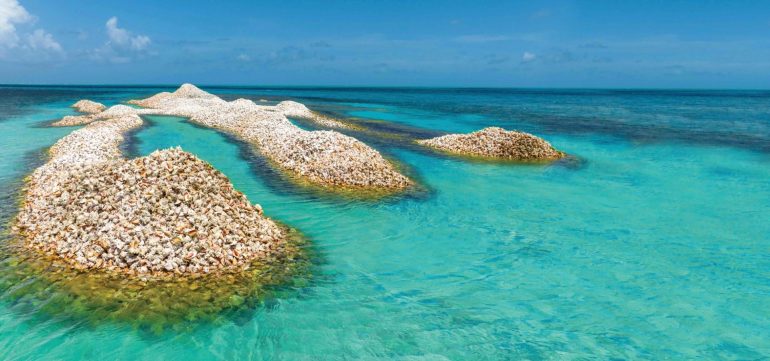Lionfish Wars: Reef Guardians Need You
So many problems beset us: global warming, water shortages, crumbling infrastructure, clowns to the left and jokers to the right—the list seems endless. Add another looming disaster—in this case, lionfish Infestation—and the eyes glaze over. Hell, the whole brain glazes over and you reach for the remote, hoping it will all go away. What can you do?
To find an answer to that question, I recently took myself to the offices of the Conservation and Fisheries Department to sit down with marine biologist Shannon Gore and with Kate Brunn of USB Dive Centre, and several CFD officers. The aim of our conversation was to learn something of the new organisation Kate is running, Reef Guardians, and to learn more about the threatening lifestyle of the voracious intruder.
The first thing I learned is that these fish are best viewed as terrorists who must be stopped at the border. Currently, they have no regular predators. They take no prisoners and they leave no survivors. Their standard operating procedure is to find a congenial location and then to devour every other living creature in the vicinity. Crabs, shrimp, fish, whatever—it's all caviar to the lionfish.
They seem to be colonizing the territory from the west—from St Croix and St Thomas. They favour deep water and have followed deep currents to get here. Areas such as Guana Island, with its swirling currents from all directions, are a natural dropping-off point for the toothy Taliban. Kate said that divers recently had neutralized nine fish on one dive in waters off Guana.
One important fact provided by CFD Officer Abbi Christopher is that the fish arrive in our waters as adolescents and are mostly males. They don't seem—yet—to be breeding in numbers here, an important fact since breeding colonies require a certain density and diversity of individuals. This is why the effort to control the lionfish is so urgent and needs to be sustained over time. By keeping numbers low, the fish can be prevented from breeding and thereby prevented from gaining control of BVI waters.
The consequences of the fish gaining ascendance in local waters are dire indeed. “If we don't curtail this problem,” says Kate, “we're not talking of an infinite number of years. If these things come in and attack like they've done in Belize, we're talking five years and then we're all done.”
As eradication efforts move forward and become more vigilant, many experts believe that the invasive creature is here to stay in its transplanted environment. A recent study published in the online marine biology journal PLoS One reveled that grouper fish in the Caribbean region actually have been found with small lionfish in their digestive tract, suggesting that the invasive lionfish might actually have met their match. The team of researchers took to the Bahamas’ Exuma Cays Land and Sea Park, one of the most extensive marine reserves in the Caribbean. It’s apparent that groupers—which now exist as an overfished and diminished population in the region—are one type of fish that have acquired a taste for the curious creatures. The report’s lead author, Professor Peter Mumby, told me that research indicates that if the grouper population stays protected from overfishing, they could prove to neutralize the lionfish detrimental affect on the reefs. “It appears that they do cause a tenfold reduction in the extent of the lionfish invasion where the most groupers were found,” the researcher told P&Y, noting that further research is necessary. “As the lionfish populations continue to increase, this will place even more pressure on natural systems to control the invasion. … But then grouper might increase their feeding on them as the become more common and easier to find and catch.”
One saving grace in this matter, as described by marine biologist Shannon Gore, is that the CFD got ahead of the problem and managed to get funding in place before the arrival, or at least the discovery, of the first lionfish into the territory's waters. The progress of the fish was known and documented so it was inevitable for the fish to get here sometime. With initial funding in place from the government, the CFD got the ball rolling by establishing relationships with the dive operators who are the logical first responders in this area since they spend their time underwater. According to Shannon, “It's going to take an effort from the community, and different groups from within the community to keep the effort going. We're still going to be overseeing it, but Kate's going to be taking it from the ground up.”
According to Kate, “We've separated the community into different segments. The fishing industry, first of all. Then the dive operators, the bare boaters and the crewed yacht industry. Each of these groups will bear a responsibility for their particular areas.”
The fishing community is, according to Kate, ahead of everyone in dealing with this issue. Fishermen saw the problem first by finding specimens in their fish pots and have worked closely with CFD in monitoring the situation. On this year’s Fishermen’s Day on July 1, efforts were highlighted with the addition to the festivities with an innagural lionfish tournament. CFD Officer Bertrand Lettsome described the exercise as a means to “educate and raise awareness on the invasive lionfish species. It also serves the greater purpose to bring immediate action to reduce the numbers of lionfish in our waters. As it relates to our marine life, a dead lionfish is the best lionfish.”
The toughest areas, says Kate, “are those where nobody goes—the marine protected areas, such as The Baths and Devil's Bay, where there are no divers in the waters. Those areas are utilized by cruise ship passengers and others who are not going to get involved in this effort. It's in these areas that the Reef Guardians will step in so if there is a sighting and there are no volunteers on the scene to remove the fish then the Reef Guardians will go in and remove it for them.”
Asked what is her ideal number of volunteers and participants in this effort, Kate said “Everybody. Everybody that makes their living from the ocean, whether you're a sailor, a diver, a fisherman—everybody has a responsibility to protect the ocean. Everybody has their role to play.”

Reef Guardians needs volunteers for a multitude of tasks, from making up lionfish markers to writing cheques. To find out what your role might be, go to
reefguardians.com or call 284-442-7783.
Editor Dan O’Connor contributed to this article





